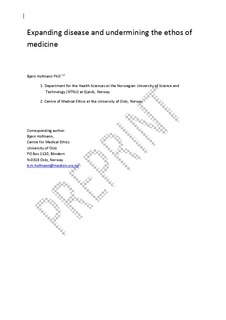Expanding disease and undermining the ethos of medicine
Journal article, Peer reviewed
Accepted version

Åpne
Permanent lenke
http://hdl.handle.net/11250/2644247Utgivelsesdato
2019Metadata
Vis full innførselSamlinger
Originalversjon
European Journal of Epidemiology (EJE). 2019, 34 613-619. 10.1007/s10654-019-00496-4Sammendrag
The expansion of the concept of disease poses problems for epidemiology. Certainly, new diseases are discovered and more people are treated earlier and better. However, the historically unprecedented expansion is criticised for going too far. Overdiagnosis, overtreatment, and medicalization are some of the challenges heatedly debated in medicine, media, and in health policy making. How are we to analyse and handle the vast expansion of disease? Where can we draw the line between warranted and unwarranted expansion? To address this issue, which has wide implications for epidemiology, we need to understand how disease is expanded. This article identifies six ways that our conception of disease is expanded: by increased knowledge (epistemic), making more phenomena count as disease (ontological), doing more (pragmatic), defining more (conceptual), and by encompassing the bad (ethic) and the ugly (aesthetic). Expanding the subject matter of medicine extends its realm and power, but also its responsibility. It makes medicine accountable for ever more of human potential dis-eases. At the same time it blurs the borders and undermines the demarcation of medicine. Six specific advices can guide our action clarifying the subject matter of medicine in general and epidemiology in particular. To avoid unlimited responsibility and to keep medicine on par with its end, we need to direct the expansion of disease to what effectively identifies or reduces human suffering. Otherwise we will deplete medicine and undermine the greatest asset in health care: trust.